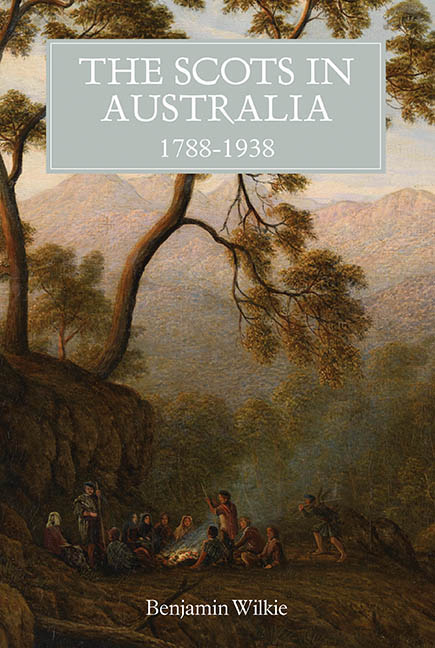Book contents
- Frontmatter
- Contents
- Illustrations
- Acknowledgements
- Abbreviations
- Introduction
- 1 From Scotland to Australia: Convicts, Free Settlers, and Encounters with Australia
- 2 Caledonia Australis: Imperial Commerce, Migrant Networks, and Australian Pastoralism
- 3 Scottish Migrants and Indigenous Australians
- 4 Imagining Home: Scottish Culture in Australia
- 5 Warriors of Empire: A Case Study of Popular Imperialism
- 6 The Empire Builders: Imperial Commerce and Migration between the Wars
- 7 New Scots: Industry, Settlement, and Working-Class Migration
- 8 At The Edge of Scotland's Diaspora: Diversity and Tension in the Twentieth Century
- Conclusion: The Imperial Legacy
- Bibliography
- Index
1 - From Scotland to Australia: Convicts, Free Settlers, and Encounters with Australia
Published online by Cambridge University Press: 23 August 2019
- Frontmatter
- Contents
- Illustrations
- Acknowledgements
- Abbreviations
- Introduction
- 1 From Scotland to Australia: Convicts, Free Settlers, and Encounters with Australia
- 2 Caledonia Australis: Imperial Commerce, Migrant Networks, and Australian Pastoralism
- 3 Scottish Migrants and Indigenous Australians
- 4 Imagining Home: Scottish Culture in Australia
- 5 Warriors of Empire: A Case Study of Popular Imperialism
- 6 The Empire Builders: Imperial Commerce and Migration between the Wars
- 7 New Scots: Industry, Settlement, and Working-Class Migration
- 8 At The Edge of Scotland's Diaspora: Diversity and Tension in the Twentieth Century
- Conclusion: The Imperial Legacy
- Bibliography
- Index
Summary
More than half of Scotland's natural population increase in the nineteenth century emigrated. At first, many went to England, but more went to the United States, and Canada came in second. Like many other Europeans, Scots followed a trail of gold around the world from California to Australia and to South Africa. The Victorian gold rushes of the 1850s were just as enticing for Scots as they were for everybody else, and Australia became the second most popular destination in the mid-nine¬teenth century. Here, arriving as both convicts and free settlers, they encountered a people and landscape unlikely anything they had known before.
Scotland during the nineteenth century was second only to Ireland among European countries that lost population through net emigration. Imperial admin¬istration, military service, colonial business and trade, and the prospect of greater opportunities in new lands all led to the mass migration of Scots across the world in the nineteenth century. Observers in the late nineteenth century saw migration as a testament to the quality of the Scottish people and as an assertion of their supreme position in the Empire. Charles Dilke wrote in 1868 that, in British colonies, ‘for every Englishman that you meet who has worked himself up to wealth from small beginnings without external aid you find ten Scotchmen. It is strange, indeed, that Scotland has not become the popular name for the United Kingdom.’ The popular understanding in Scotland in the nineteenth century was that the Scots were a ‘virile and expansive race’ who took great pride in making a ‘deep mark on the stage of world history’. This triumphal narrative, of course, has little to do with reality.
Most people who left Scotland in the nineteenth century did so in search of a better job and better conditions. Rarely do migrants leave their homelands simply for the sake of a spirited adventure. The choice to emigrate, while indicative of autonomy and mobility, often has its roots in the migrant's material circumstances. As the economic historian Roy Campbell observed, ‘[w]hatever the success and achievements of Scots abroad, their journey from Scotland often began with failure at home’. Although migration may have been accompanied by positive benefits, ultimately the decision to leave involved a condemnation of the social and economic conditions at home.
- Type
- Chapter
- Information
- The Scots in Australia, 1788–1938 , pp. 13 - 30Publisher: Boydell & BrewerPrint publication year: 2017



